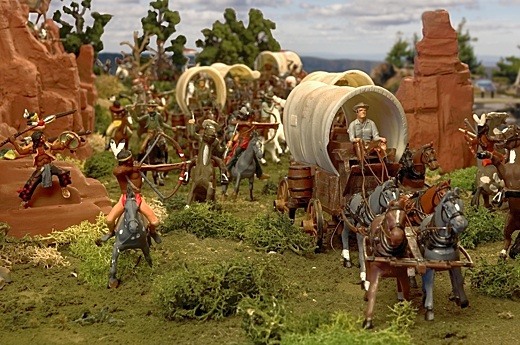 Image above: Miniature recreation of migration of illegals entering native American territory.
From http://garytangeman.wordpress.com/2008/07/26/scenes-of-the-old-west
By Kurt Cobb on 8 November 2009 in Resource Insights -
http://resourceinsights.blogspot.com/2009/11/immigration-and-our-ecological_08.html
Image above: Miniature recreation of migration of illegals entering native American territory.
From http://garytangeman.wordpress.com/2008/07/26/scenes-of-the-old-west
By Kurt Cobb on 8 November 2009 in Resource Insights -
http://resourceinsights.blogspot.com/2009/11/immigration-and-our-ecological_08.html
Whenever the word immigration is mentioned, two polarized camps almost immediately emerge. One camp considers new residents an asset, bringing new ideas and entrepreneurial zeal to a society, while the other considers immigration a bane, bringing crime, disease, poverty and culturally disruptive practices.
Only very rarely mentioned by those opposing immigration is a concern that the host country has run out of carrying capacity and cannot afford to feed, clothe, educate and keep healthy any more people. Immigration opponents may claim that their home country cannot afford additional people. But, by this they do not ordinarily mean that the population and the economy of the country should cease to grow. They simply mean they do not wish to share any growth with newcomers. The carrying capacity of many industrialized nations was probably reached several decades ago. If a country imports critical resources--oil and food come to mind--then it has in all likelihood overshot its carrying capacity. So, while lack of carrying capacity has some validity as an argument against immigration, it is difficult to apply in a globalized economic environment. This is because most wealthy countries import a significant portion of their carrying capacity. The destruction resulting from this importation takes place "over there" where the forests are leveled, the land is eroded, the mines are depleted and the rivers are poisoned. Those in the importing country simply do not feel the effects of that undermining of world carrying capacity and therefore assume that carrying capacity has not been reached or at least that it has not been impaired by the standard of living in the importing country. The usual retort is that the water and air are cleaner today than they were 30 years ago in the importing country. What's not mentioned, of course, is that the damage the importing country is doing through its consumption has simply been shifted elsewhere. Now, if we reframe the issue not as one of immigration, but rather as one of mass migration, we will complicate things even further. For much of the migration we are seeing today is from countries which export resources to wealthy nations. In other words, we are seeing mass migrations from resource exporting countries where carrying capacity is being systematically undermined toward countries that are importing that carrying capacity. One concrete example is Mexico which has been exporting its carrying capacity in the form of oil for decades. It has also been exporting other minerals and foodstuffs as well. As oil production plummets in Mexico, the ability of the nation to function has become impaired. The government is having trouble keeping its population safe from drug cartels which now control a significant share of the country. Jeff Vail, a contributor to The Oil Drum and a former U. S. Air Force intelligence officer wrote in 2007 that he believed that Mexico was already on the path to collapse. He updated his views earlier this year and sees the process is actually further along. What this means is that the already substantial flow of immigrants from Mexico into the United States is likely to turn into a torrent as economic opportunities and personal safety decline in Mexico. A government that relies on oil profits for 40 percent of its budget will be hard pressed to provide the economic activity and the social services to satisfy all of its population as oil profits continue to decline with oil production. As similar dramas unfold elsewhere--Vail mentions Nigeria and Iraq--we can expect a rise in the tempo of migrations from countries that are exporting their carrying capacity to countries that are importing it. This will no doubt be accompanied by calls to limit immigration. If the flow becomes great enough, it might result in military action to close borders, at least temporarily. If policymakers do not recognize that the decline in carrying capacity is one of the key drivers of contemporary mass migrations, they cannot hope to address the situation. And, simply shutting the borders when the flow of people becomes too great may turn out to be problematic for those wealthy countries that currently import a substantial share of their carrying capacity. How will they maintain an orderly flow of imports while at the same time exclude people who are not legally allowed to enter? It would be felicitous if new policies were enacted to raise carrying capacity by drastically reducing consumption in wealthy countries and gradually reducing population everywhere. As long as consumption in wealthy countries remains at or near its current levels, those countries will continue to be on a collision course with mass migrations born of ecological overshoot and skewed trade relations--trade relations which have for so long allowed the wealthy to export their environmental degradation elsewhere and saddle the poor with the consequences.
No comments :
Post a Comment